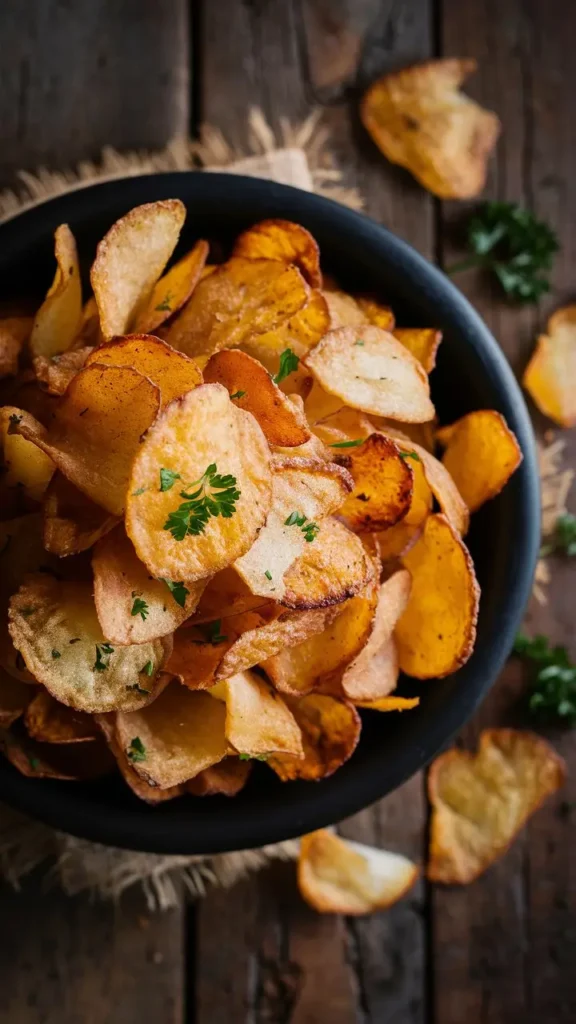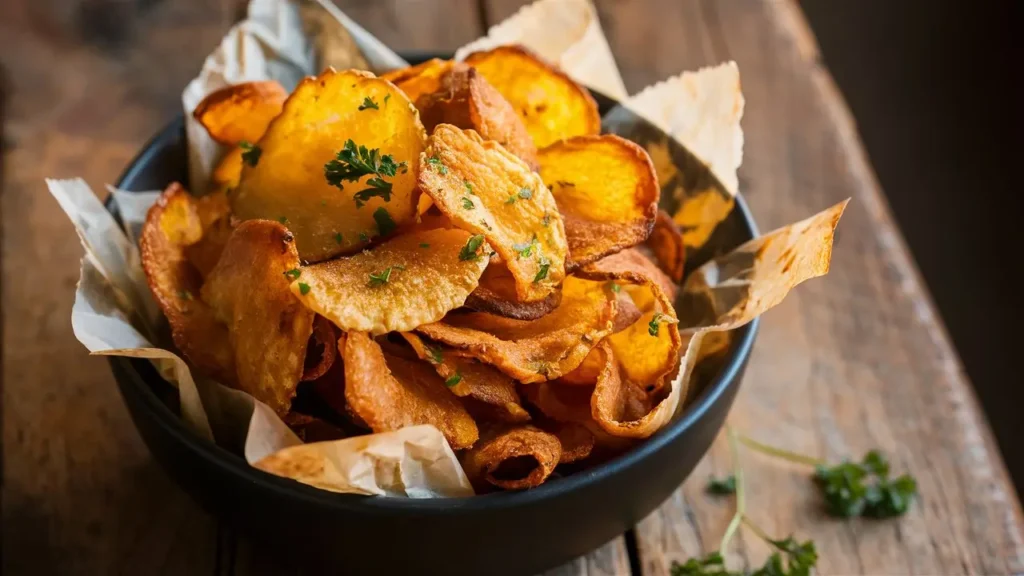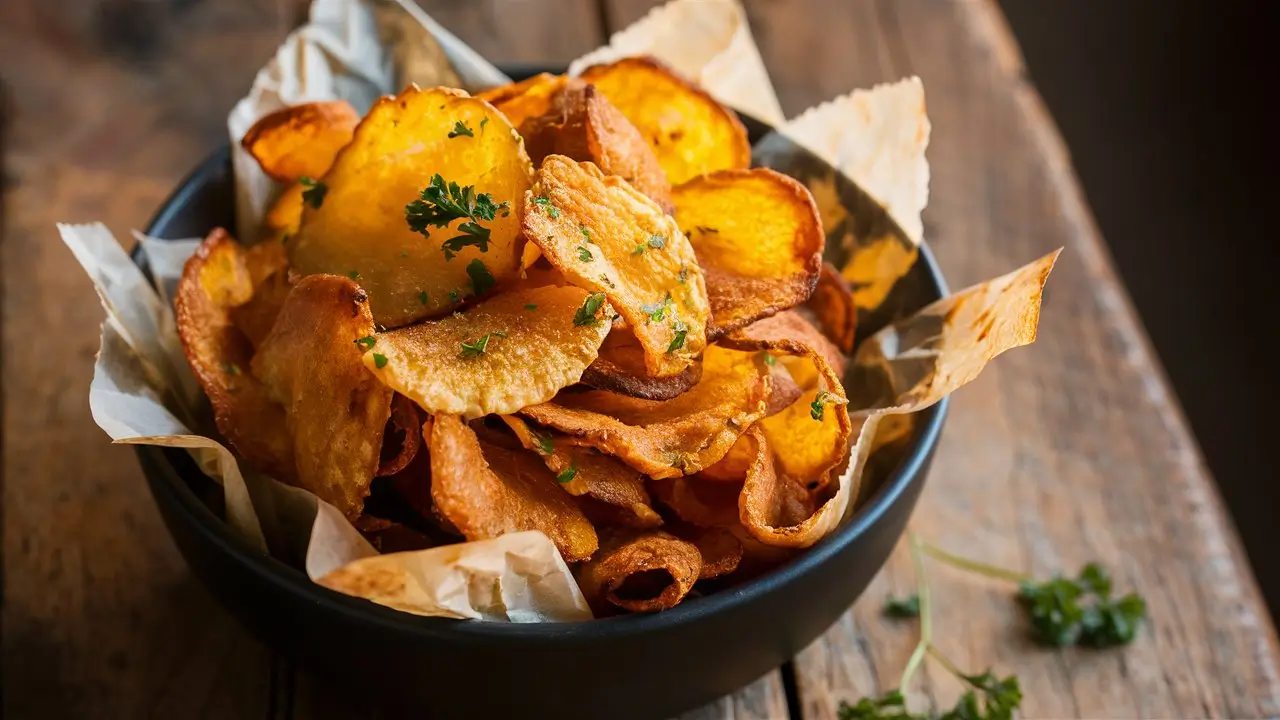Potato chips are one of the world’s most beloved snack foods. Crispy, salty, and endlessly customizable, they’ve earned their spot in pantries, party bowls, and lunchboxes across the globe. Whether you prefer them kettle-cooked, thin and crunchy, or seasoned with bold spices, homemade potato chips allow you to control the flavor and freshness in every bite. This article is your ultimate guide to making delicious potato chips at home—from choosing the right potatoes to mastering the perfect crisp.
Why You Will Love This Recipe
-
Simple Ingredients: You only need a few pantry staples to create something amazing.
-
Customizable Flavors: Salt, vinegar, barbecue, spicy, herbed—you can flavor them your way.
-
No Preservatives: Unlike store-bought versions, these are fresh and clean.
-
Crispy Every Time: With the right technique, every chip can be golden and crisp.
Ingredients List
-
4 large russet potatoes (or Yukon Gold)
-
2 cups vegetable oil (for frying)
-
1 teaspoon salt (adjust to taste)
-
Optional seasoning:
-
Garlic powder
-
Onion powder
-
Paprika
-
Black pepper
-
Vinegar powder
-
Barbecue seasoning
-
Fresh herbs (rosemary, thyme, parsley)
-
Timing & Servings
-
Prep Time: 20 minutes
-
Cook Time: 15 minutes per batch
-
Total Time: 1 hour
-
Servings: 4-6 people (makes about 6 cups of chips)
Step-by-Step Instructions for Potato Chips
Step 1: Wash and Peel the Potatoes
Scrub your potatoes thoroughly. You can peel them for a clean look or leave the skin on for extra texture and flavor.
Step 2: Slice the Potatoes Thinly
Use a mandoline slicer or a sharp knife to cut the potatoes into thin, even slices—about 1/16 inch thick. Uniformity is key to even cooking.
Step 3: Soak the Slices
Soak the slices in a bowl of cold water for at least 30 minutes. This helps remove excess starch and prevents sticking. For crispier chips, you can soak them for up to 2 hours.
Step 4: Dry the Slices
Drain the slices and pat them dry thoroughly using paper towels or a clean kitchen cloth. Excess moisture will cause the oil to splatter.
Step 5: Heat the Oil
Heat vegetable oil in a deep fryer or large, heavy-bottomed pot to 350°F (175°C). Use a thermometer for accuracy.
Step 6: Fry in Batches
Fry the slices in small batches to avoid overcrowding. Stir gently so they don’t stick together. Fry until golden and crisp, about 3–4 minutes per batch.
Step 7: Drain and Season
Use a slotted spoon to remove the chips and place them on a paper towel-lined tray to drain. Immediately sprinkle with salt or your favorite seasoning while still hot.
Step 8: Cool Completely
Let the chips cool completely before serving. This helps lock in the crispiness.

Best Potatoes for Chips
Russet Potatoes
High in starch and low in moisture, they’re ideal for crispy chips.
Yukon Gold
They provide a creamier flavor and golden color but can be slightly less crispy.
Avoid Waxy Potatoes
Red potatoes and new potatoes hold too much moisture and won’t crisp well.
Flavor Variations
Classic Sea Salt
Simple and timeless—just salt on hot chips.
Vinegar and Salt
Toss chips in vinegar powder before adding salt for a tangy bite.
Barbecue
A mix of paprika, onion powder, garlic powder, and brown sugar makes a smoky chip.
Spicy Chips
Add cayenne pepper or chili powder for a hot twist.
Herbed Chips
Toss with dried rosemary, thyme, or oregano for an elegant snack.
Healthier Alternatives
Baked Potato Chips
Brush thin slices with oil and bake at 400°F (200°C) for 15–20 minutes, flipping halfway through.
Air-Fried Chips
Use an air fryer to make crispy chips with much less oil.
Microwave Chips
Layer slices between parchment in the microwave and cook for 3–5 minutes per batch for an ultra-low-oil version.
How to Store Potato Chips
-
Let them cool fully before storing.
-
Keep in an airtight container at room temperature.
-
Add a few grains of uncooked rice or a paper towel to absorb moisture.
-
Best eaten within 3 days for peak crispiness.
Serving Suggestions
-
Serve with dips like sour cream and onion, ranch, or guacamole.
-
Great as a side with burgers, sandwiches, or hot dogs.
-
Pair with cocktails, beer, or a cold soda for parties and game nights.
Common Mistakes to Avoid
-
Slicing Too Thick: Thick chips don’t crisp up properly.
-
Skipping the Soak: Removing starch is crucial for crunch.
-
Crowding the Oil: It drops the temperature and leads to soggy chips.
-
Not Using a Thermometer: Oil temperature is critical to success.
-
Seasoning Late: Add salt and spices right after frying.
Tips for Extra Crispy Chips
-
Soak for longer (up to 2 hours).
-
Use russet potatoes only.
-
Dry very well before frying.
-
Use a high smoke-point oil like peanut or vegetable oil.
-
Cool completely on a wire rack for airflow underneath.
Nutritional Information (Per Serving)
-
Calories: ~220
-
Fat: 14g
-
Carbohydrates: 24g
-
Protein: 2g
-
Sodium: 170mg Values depend on oil absorption and seasoning used.
Make-Ahead and Reheating
Make-Ahead Tips
You can slice and soak the potatoes ahead of time. Store them in water in the fridge for up to 24 hours.
Reheating Tips
Re-crisp chips in an oven at 375°F (190°C) for 5 minutes. Avoid microwaving, as it softens the chips.
FAQs
Can I use olive oil to fry potato chips?
Olive oil has a lower smoke point and may burn at frying temperatures. Use vegetable, canola, or peanut oil instead.
Why are my chips soggy?
They were likely sliced too thick, not dried well, or fried in oil that wasn’t hot enough.
How do I make flavored chips?
Sprinkle your seasoning mix right after frying while the chips are still warm so the spices stick.
Can I reuse the oil?
Yes, strain the oil and reuse it for frying up to two more times if it’s not burnt or overly flavored.
Are baked chips healthier?
Yes, baked chips contain less fat and fewer calories than fried versions.
Conclusion
Potato chips are the kind of snack that brings joy with every crunch. When made at home, they’re fresher, more flavorful, and totally customizable. Whether you’re crafting a party platter or prepping lunchbox snacks, homemade potato chips are a satisfying way to elevate a simple potato into a crave-worthy treat. Try different flavors, methods, and potatoes until you find your favorite combination—because once you master the basics, the possibilities are endless.
